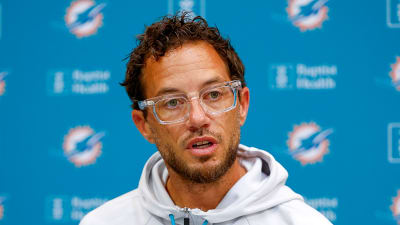
Gian van Veen opened up about his struggles with Dartitis and how it manifested itself that he was accused of cheating by an opponent on the Challenge Tour previously.
Now a World Youth Champion and a hot property in the world of darts, it wasn't so easy for Van Veen previously who is one of a myriad of players who have suffered with dartitis. Thomas Banks was mentioned in particular during his interview and he said about his own personal struggles.
“I still remember one game on the Challenge Tour when I first got Dartitis and my opponent was angry at me because he thought I was doing it on purpose,” Van Veen recalls to Huw Ware's Tops and Tales podcast. “I was in tears, crying my eyes out in the middle of Barnsley Metrodome because I was struggling so badly. And for my opponent to tell me I was cheating or something — it was heartbreaking.”
It was 2020 or 2021. Van Veen was just 18 or 19 years old, already in his third Q School. But despite the challenges, he had started to find some form. “I remember going to my third Q School, but it was the first time I really played well, like a steady 85 to 88 average for the whole year. So I went there thinking, ‘I'm not expected to get a card, but if I have my week, I can certainly get one.’”
But Dartitis had other plans. “I struggled so much that week. I still remember, the whole tournament was at the last eight and I was still playing my last 32 game. It had just started because I was playing so slow. I was really struggling.”
Despite that, Van Veen believes Dartitis — paradoxically — improved his game. “The weird thing is, I played better through it. I started averaging like 85 with Dartitis. But when I got rid of it, I averaged 92, 93, because in my head, I was like, ‘You're not going to release the dart until you're 100% sure you're going to hit the target.’ So it took a while, but I started playing better, winning more games, and that massively grew my confidence. And that's how I eventually got rid of it.”
“I was scared of losing. Scared of what people might think.”
The root cause? Anxiety. Fear. Pressure. Something that many young players are increasingly facing in the modern game. “Yeah, for me it was [anxiety-related]. I was just scared of losing. Scared of what people might think of me when I played bad.
In my head, especially when I was on a double, I’d think: ‘What happens if you miss? People won’t laugh at you, but they’ll think things. You might let people down. Your family. Yourself.’ And when all that’s going through your mind, you’re not going to release it — because you don’t want to miss.”
Social media, he says, only adds to the mental load on young players. "That’s why you see it with youngsters. Social media puts a lot of pressure on them. That’s just the world as it is now.
I really felt that too. You’ve got pressure from yourself, but also from your surroundings. And that’s why it becomes a massive mental block to play darts.”
Embracing the fear of not letting go
Van Veen found his turning point not by resisting the Dartitis, but by accepting it. “I think that’s a good way to put it, I embraced it instead of thinking ‘I want to get rid of it.’ I just dealt with it as I was playing.
As I said, I started playing better, and my confidence grew. I got to a point where I was like, ‘Who cares what everyone thinks? You're playing for yourself. If you lose, you're the only one affected. Three hours later, no one cares what you did. It's about what you're doing in that moment. And you're the only one in control.”
That shift in mindset helped him reframe his Dartitis not as a weakness, but as something he could build into his game. “People still see me do the ghost throw — I think that’s what it’s called — just to get my arm loosened up. That’s still an effect of Dartitis, because I didn’t do it before. But I’m okay with that. I’m just embracing it.
A lot of players do that anyway — even ones who haven’t had Dartitis. I’ve seen it loads of times. So I’ve really embraced it and put it into my game. And I think… yeah, in a weird way, Dartitis helped me.”
“There used to be a time Dartitis meant the end.”
There was a time when Dartitis felt like a death sentence for a player’s career. But Van Veen, like Nathan Aspinall and others, is part of a new generation showing it doesn’t have to be that way. “I’m not encouraging people to get Dartitis — it’s really tough. But yeah, I think in a weird way it’s helped my career so far.”
The response he got from others was, largely, supportive — and that made all the difference. “That [Challenge Tour game] was the only negative impact it had on me. The rest — everyone wasn’t feeling sorry for me, but they understood what I was going through. And yeah, I think that really helped.”
“You're not letting anyone down.”
As the interviewer and referee Huw Ware opened up about his own anxiety while refereeing, the conversation turned deeply personal and deeply relatable. “I suffer from anxiety badly. I overthink so much. Even when I’m refereeing, I’ve had anxiety attacks on big stages — trying too hard to impress, not make mistakes, be the best referee I can be. And it becomes a whirlpool. You panic because you don’t know how to solve it. Does that all resonate?" quipped Ware.
“100%,” Van Veen said. “Everything you’re saying now — of course not as a referee — but as a player, I can relate. It’s the same principle.
As you said, it’s a whirlpool — you’re drowning in your own thoughts. But I guess if you can think about your family, your friends, your girlfriend — they’re going to be proud of you anyway. And that can ease that anxiety.” He paused, then smiled. “I don’t know if you know my family, but I know them. And I know they’d never feel like I’ve let them down.”
World title dream for Van Veen
The final question brought laughter and perspective — but also a glimpse into Van Veen’s ambitions. “How many world titles do I want to win? About 20!” [laughs] “Yeah, that’s fine. No problem.”
But he quickly added a more grounded goal. “I’m not going to sit here and say, ‘I’m going to win five world titles.’ I’ll be very happy with my career if I win one. I think so far, my career’s already been very successful. But yeah, I’d love to top it off — whether it’s in 20, 25, 30 years — with a world title. Doesn’t matter if it’s next year or in 10 or 15 years. Just win one, and I’ll be very satisfied.” And does he have a time limit on that dream? “No. If I win it at the age of 45, I’ll be happy.”
More must-reads:
- Falcons' Raheem Morris addresses Kirk Cousins, Michael Penix Jr. chatter
- Why Browns insider thinks Shedeur and Deion Sanders 'made a big mistake'
- The '150-rushing-yard NFL games' quiz
Breaking News
Trending News
Customize Your Newsletter
 +
+
Get the latest news and rumors, customized to your favorite sports and teams. Emailed daily. Always free!








